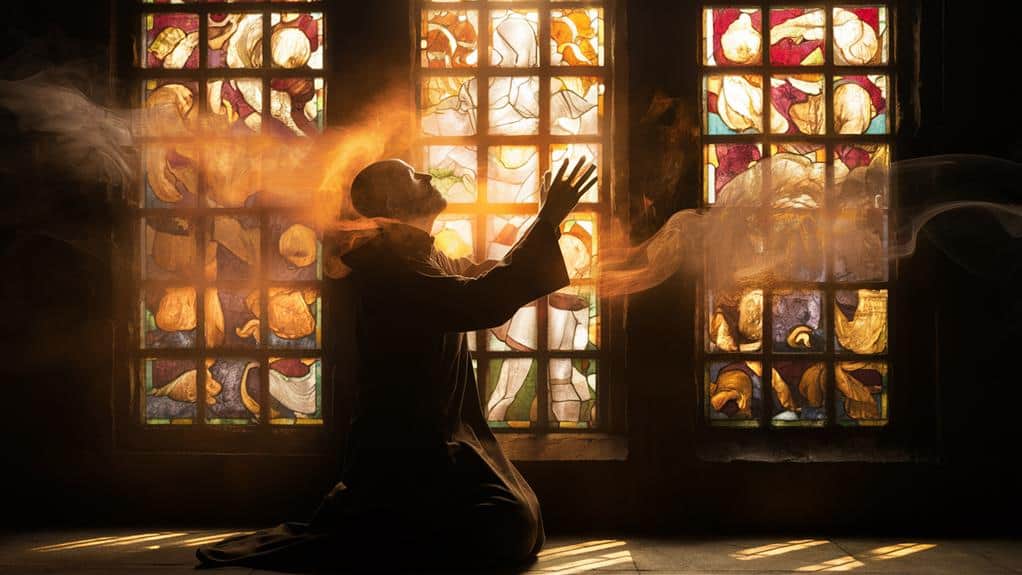The Concept of the “Cloud of Unknowing” in Christian Mysticism
You’ll find that the “Cloud of Unknowing” presents one of Christianity’s most intriguing paradoxes: to know God, you must be willing to unknow everything you think you understand. This 14th-century mystical concept challenges your conventional approach to spiritual growth by suggesting that the divine dwells not in the light of knowledge, but in the darkness of sacred uncertainty. As you step away from intellectual pursuits and enter this cloud of unknowing, you’ll discover a path that’s both ancient and remarkably relevant to modern spiritual seeking. What lies beyond the familiar territory of reason and logic is where this journey truly begins.
Historical Origins and Medieval Context

Although its anonymous author remains unknown, The Cloud of Unknowing emerged in 14th century England during a flourishing period of medieval mystical literature. You’ll find it nestled within a rich tradition of contemplative texts that emerged alongside works by Julian of Norwich and Richard Rolle, reflecting the era’s deep spiritual yearnings.
When you explore the historical context, you’ll discover how this text drew from earlier Christian mystical traditions, particularly the works of Pseudo-Dionysius and the apophatic approach to knowing God. The author’s mastery of Latin theological works suggests they were likely a monastic figure, well-versed in both scholarly and contemplative practices.
You’re encountering a work that emerged during a time of significant social upheaval, as the Black Death had recently devastated Europe and the Church faced internal struggles. Yet it’s within this crucible of uncertainty that you’ll find the text’s enduring message: the path to divine understanding paradoxically requires you to embrace unknowing.
The author’s choice of Middle English, rather than Latin, suggests they intended to make these profound teachings accessible to a broader audience.
The Path of Divine Darkness
How does one find light through darkness? In the mystical tradition of the Cloud of Unknowing, you’ll discover that divine illumination paradoxically comes through entering a sacred darkness – a darkness that’s not an absence of light, but rather an overabundance of it.
You’re called to let go of your familiar mental constructs and intellectual certainties, stepping into a cloud where ordinary knowledge falls away.
In this cloud, you’ll encounter what the mystics call “divine darkness,” where you can’t grasp God through your usual methods of understanding.
You’re invited to abandon the comfort of rational thought and enter a state of unknowing that transcends your intellectual capabilities.
This isn’t a path of accumulating more knowledge, but of letting go – releasing your conceptual frameworks, your cherished images of the divine, and even your spiritual expectations.
As you journey deeper into this darkness, you’ll find that it’s actually illuminating, teaching you to perceive with the heart what the mind can’t comprehend.
The cloud becomes your teacher, showing you that sometimes you must lose your way to find your true direction.
Contemplative Prayer Through Unknowing

The sacred darkness of unknowing finds its deepest expression through contemplative prayer, where words and concepts fall away into silence.
In this practice, you’re called to release your grip on intellectual understanding and enter a space beyond thoughts, beyond images, beyond the familiar territory of rational mind. You’ll discover that true prayer emerges not from what you know, but from the willing surrender of knowledge itself.
As you enter this cloud of unknowing, you’re invited to rest in the tension between seeking and releasing.
You’ll find that every attempt to grasp God through concepts becomes a barrier to genuine encounter. Instead, you’re asked to cultivate a loving attention that transcends mental constructs, allowing yourself to be present in the darkness where divine mystery dwells.
This isn’t a passive state but an active engagement with the unknown, where you learn to trust what you can’t see or comprehend.
Through this contemplative approach, you’ll gradually recognize that the path to divine union doesn’t lie in accumulating spiritual knowledge, but in the courageous act of letting go into the vast expanse of holy unknowing.
Beyond Intellect and Reason
Moving beyond intellectual understanding requires a radical shift in how you approach divine mystery. You’ll need to set aside your familiar patterns of reasoning and analysis, allowing yourself to enter a space where knowing happens through unknowing.
In this contemplative domain, you’re invited to transcend the limitations of rational thought and embrace a deeper form of wisdom that doesn’t depend on logical constructs.
When you release your mind’s constant need to categorize and explain, you’ll discover that truth often reveals itself in ways that can’t be contained by intellectual frameworks. You’re not abandoning reason entirely, but rather recognizing its boundaries and stepping beyond them.
The divine reality you’re seeking exists in a dimension that transcends human cognitive capacity – it’s like trying to pour the ocean into a teacup. Your intellect, however brilliant, simply isn’t equipped to fully grasp the infinite.
Instead of struggling to understand through mental effort, you’re called to rest in a state of receptive awareness where wisdom flows not from accumulation of knowledge, but from the surrender of your need to know.
This paradoxical approach opens doorways to understanding that your rational mind could never access.
Modern Applications in Spiritual Life

Ancient contemplative wisdom finds remarkable resonance in today’s fast-paced world, where information overload and constant digital stimulation can overwhelm our spiritual sensibilities.
You’ll discover that the “Cloud of Unknowing’s” practices offer a powerful antidote to modern distractions, inviting you to embrace sacred silence and contemplative stillness.
In your daily spiritual practice, you can apply these medieval insights by creating intentional spaces of unknowing. When you’re feeling overwhelmed by life’s complexities, you’ll find solace in surrendering your need to understand everything intellectually.
Through centering prayer or contemplative meditation, you’re learning to rest in the mystery of divine presence, letting go of the constant drive to analyze and categorize your spiritual experience.
The practice becomes particularly relevant when you’re maneuvering through digital overwhelm. You’ll notice that by adopting the cloud’s approach of loving attention beyond thought, you’re developing a natural immunity to information addiction.
This contemplative path doesn’t reject modern life but transforms how you engage with it, helping you maintain inner peace amid external chaos while deepening your spiritual connection through simplified, direct experience.









